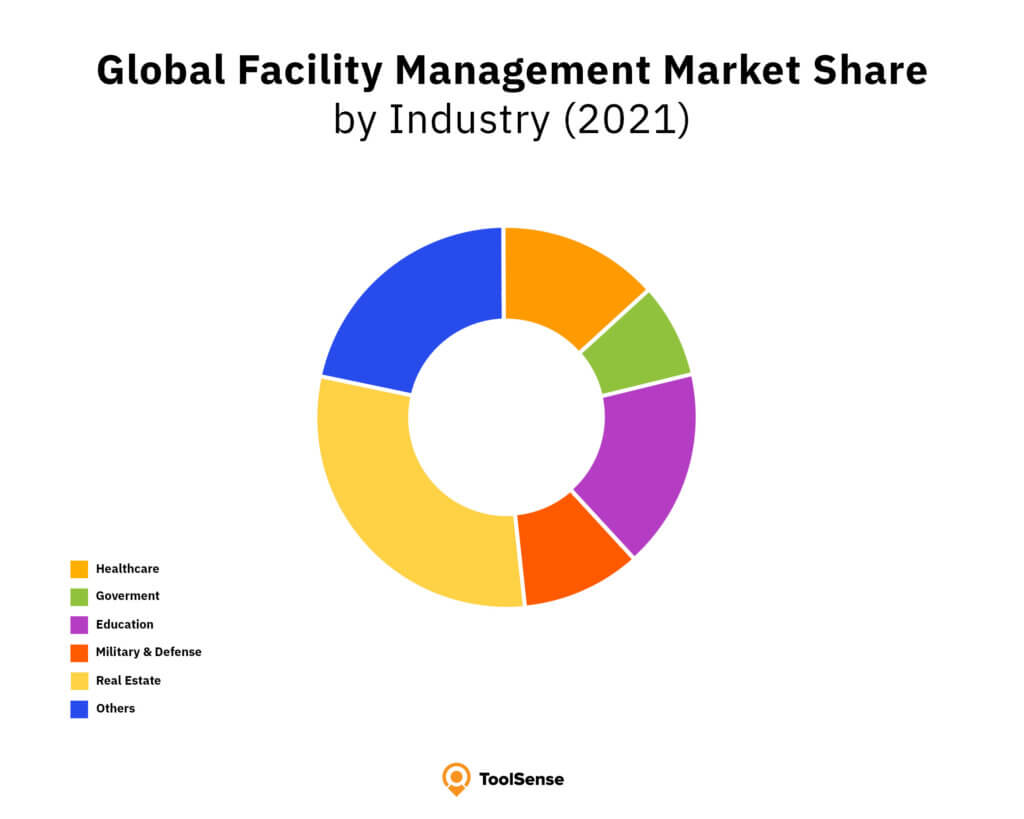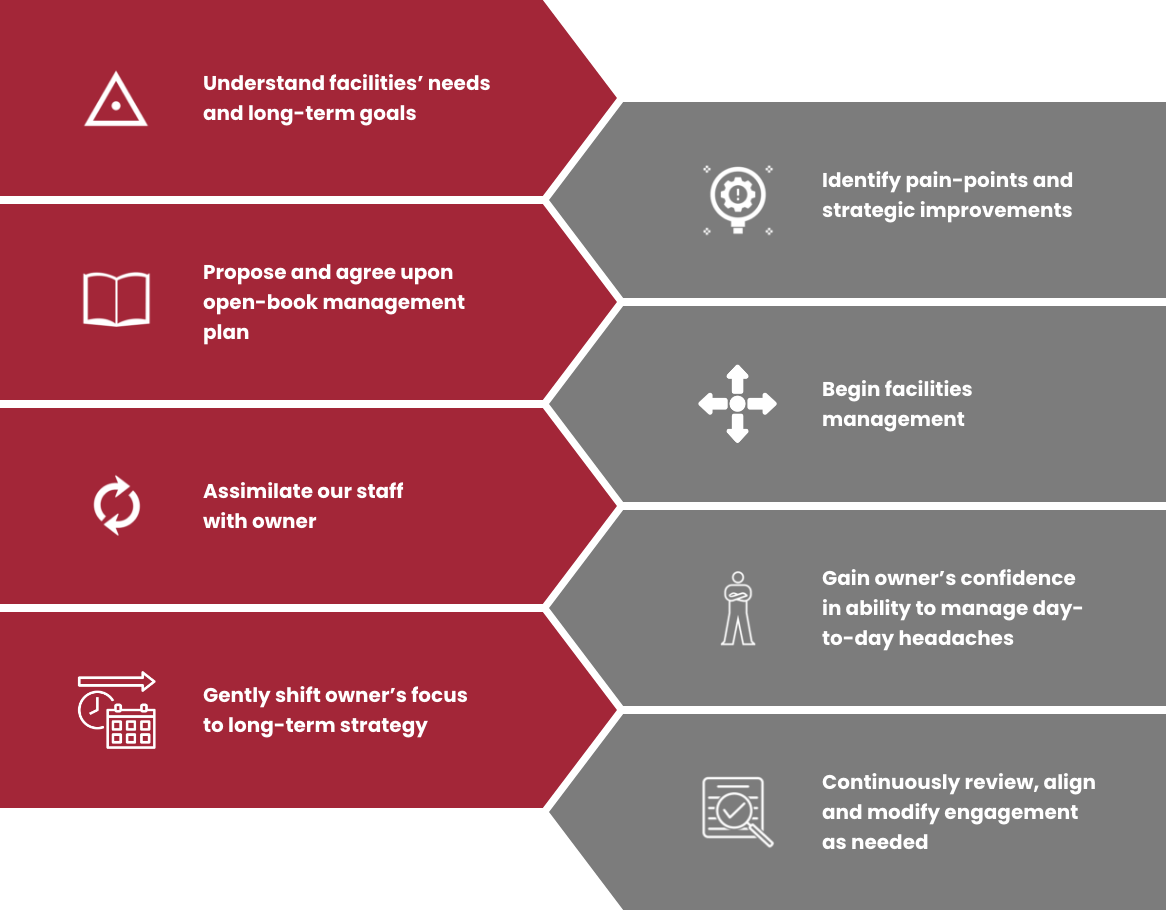Why Facility Management is Vital for Property Durability
Why Facility Management is Vital for Property Durability
Blog Article
Secret Trends Forming the Future of Center Management in 2024
As we look in advance to 2024, the landscape of facility administration is poised for significant change, driven by several crucial patterns. The combination of wise structure innovations and a change towards data-driven decision-making assurance to boost functional performance while focusing on sustainability in practice.
Smart Structure Technologies

Smart building technologies include a broad range of systems, including intelligent lighting, cooling and heating controls, and safety and security systems. By incorporating these systems, facility supervisors can check and readjust specifications in real-time, causing considerable reductions in energy waste and functional costs. For example, clever sensing units can identify tenancy levels and adjust lighting and temperature level accordingly, making sure that energy is only made use of when required.
Moreover, these modern technologies promote improved information collection, allowing companies to track usage patterns and determine possibilities for further enhancements. The execution of clever building innovations not only adds to sustainability goals however additionally creates much healthier work environments that can boost employee productivity and complete satisfaction.
As we relocate right into 2024, the adoption of smart structure innovations will likely accelerate, reflecting a more comprehensive change in the direction of more intelligent, receptive, and sustainable center management techniques.
Data-Driven Choice Making
Increasingly, companies are leveraging data-driven choice making to boost center management methods. By utilizing information analytics, facility managers can obtain workable insights that dramatically enhance operational effectiveness and source allowance. The assimilation of sophisticated innovations, such as IoT sensing units and real-time tracking systems, enables the collection of huge quantities of data on building performance, tenancy prices, and energy consumption.
This wide range of details enables center supervisors to identify trends, forecast maintenance requirements, and proactively address concerns before they escalate. For example, predictive analytics can forecast devices failures, lowering downtime and repair work expenses. Additionally, data visualization devices facilitate far better communication amongst stakeholders, ensuring that informed choices are made collaboratively.
In addition, data-driven techniques improve strategic preparation by enabling center supervisors to examine the effectiveness of current techniques and make notified choices regarding investments in technology or infrastructure. As organizations increasingly focus on operational quality, data-driven decision making is poised to end up being a keystone of effective center administration techniques in 2024 and past. Ultimately, the capacity to take advantage of data successfully will equip companies to produce more effective, effective, and durable centers.
Sustainability and Environment-friendly Practices
The focus on data-driven decision making naturally straightens with the expanding concentrate on sustainability and environment-friendly practices within facility management. As companies increasingly focus on environmental obligation, center supervisors are leveraging analytics to enhance resource usage, decrease waste, check my blog and lessen carbon impacts. This strategic method enables the assimilation of energy-efficient systems, such as LED illumination, smart heating and cooling controls, and sustainable power sources right into center procedures.
Furthermore, the implementation of lasting practices extends beyond power intake. Center managers are adopting green products and advertising recycling efforts to develop a circular economic climate within their centers. This not just boosts the ecological profile of the organization but also fosters a society of sustainability among staff members.
Conformity with environmental policies is one more essential element driving the fostering of eco-friendly methods. By utilizing information analytics, center managers can keep an eye on conformity metrics and determine areas for improvement, ensuring adherence to worldwide and local sustainability standards.
Crossbreed Work Designs
A significant shift in the direction of crossbreed job models is improving the landscape of facility management in 2024. This paradigm combines in-office and remote job, necessitating a reevaluation of room utilization, source allotment, and employee interaction methods. Organizations are increasingly identifying the importance of versatile workspaces that satisfy diverse demands and preferences.
Center supervisors have to adapt by implementing flexible office styles that sustain joint efforts while supplying areas for focused job. This consists of the integration of innovation to promote seamless communication and cooperation among in-office and remote employees. Smart building solutions, equipped with analytics and sensors, permit real-time tracking of area use, making it possible for organizations to maximize their settings successfully.
In addition, hybrid job designs highlight the demand for reliable center monitoring that prioritizes employee experience. In significance, the hybrid job version is transforming facility management, motivating a proactive strategy to satisfy the progressing demands of the labor force.
Enhanced Resident Wellness
As organizations embrace hybrid work models, an increased concentrate on occupant health is coming to be essential to facility administration methods. Facility Management. This change recognizes that a satisfied and healthy and balanced labor force directly affects productivity and retention prices. Facility managers are currently prioritizing settings that promote physical and psychological wellness, integrating components such as all-natural lights, biophilic style, and accessible wellness sources

Innovation plays a critical duty in this evolution. Smart structure systems can monitor environmental aspects and change settings in real-time, making sure ideal comfort levels - Facility Management. Comments mechanisms, such as tenancy sensors and staff member surveys, permit center supervisors to continually improve wellness initiatives based on resident requirements.

Verdict
In 2024, the future of center monitoring will certainly be significantly affected by the assimilation of wise structure innovations and data-driven decision-making, promoting enhanced functional effectiveness. These trends jointly underscore More Bonuses the evolving landscape of facility management in response to modern obstacles and possibilities.
Center supervisors are promoting and adopting environmentally friendly materials recycling initiatives to develop a round economic climate within their facilities.A significant shift in the direction of crossbreed work models is improving the landscape of center administration in 2024.Furthermore, hybrid job designs highlight the need for reliable facility administration that prioritizes staff member experience.As companies embrace hybrid job designs, a heightened emphasis on passenger wellness is becoming important to facility monitoring methods.In 2024, the future of facility management will certainly be significantly influenced by the assimilation of clever structure innovations and data-driven decision-making, cultivating enhanced operational effectiveness.
Report this page